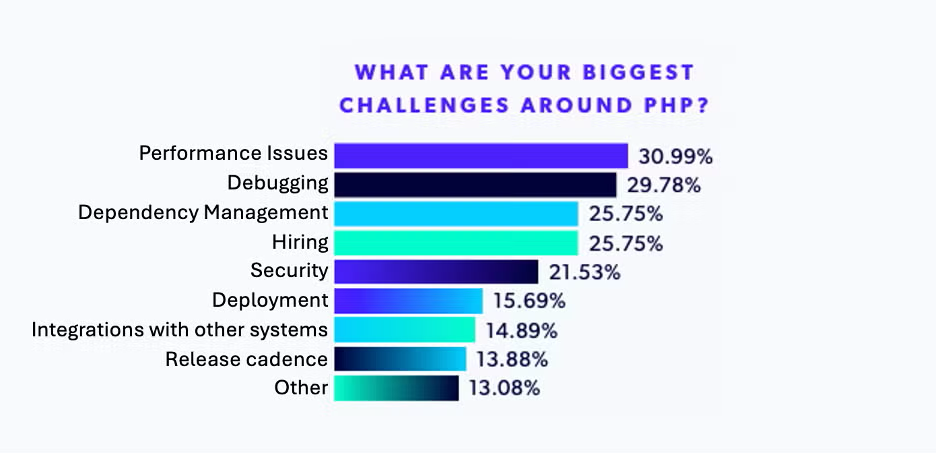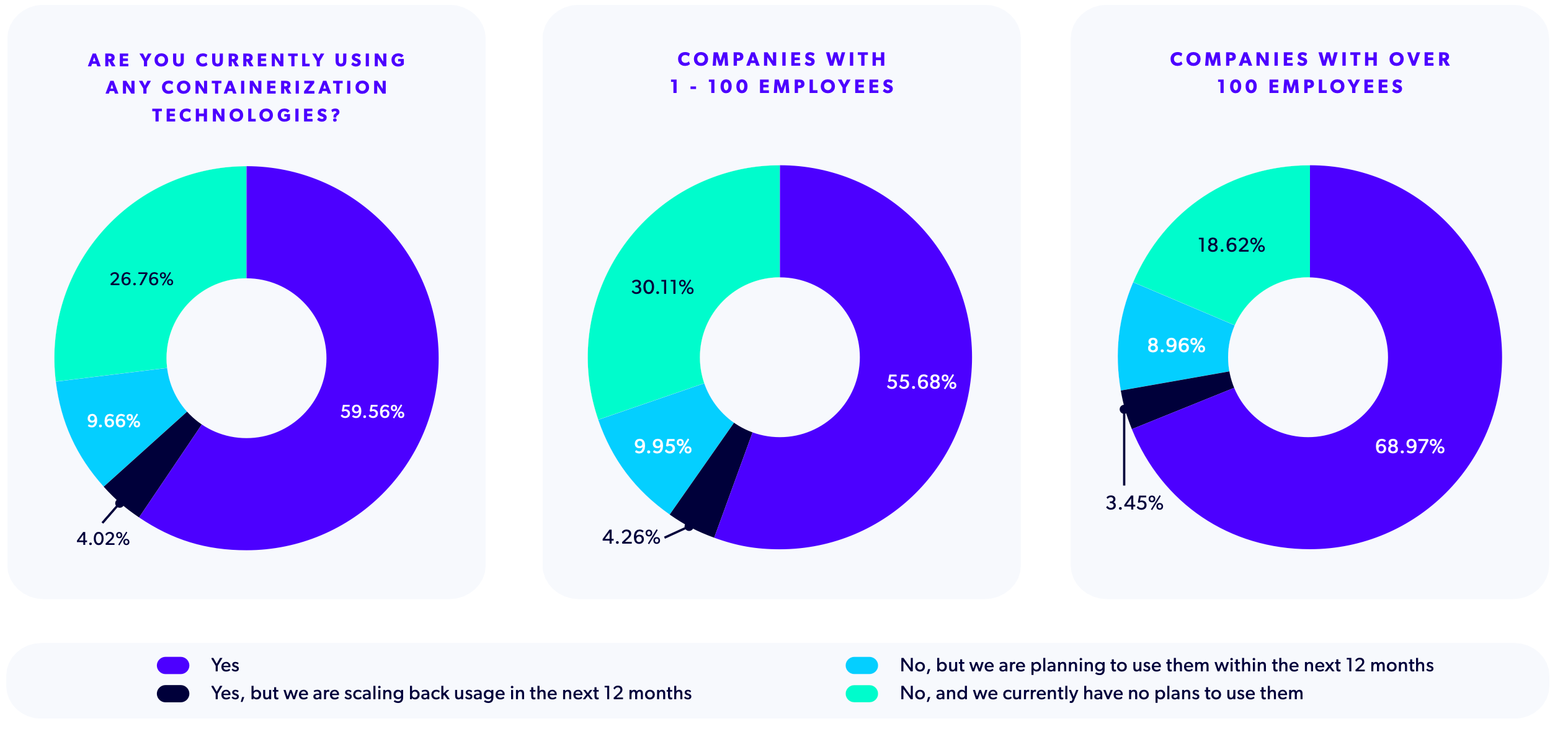Blog
July 10, 2025
PHP maintenance is a critical part in any PHP strategy, covering bug fixes, performance improvements, updates, and more. However, when examining our findings from the latest edition of the PHP Landscape Report, we found that many teams are deprioritizing crucial PHP maintenance tasks for other concerns, which can cause technical debt to accrue at an alarming pace.
In this blog, I take an in-depth look at the state of PHP maintenance in 2025, explore how gaps in PHP maintenance can impact your business, and offer practical strategies to help your team stay ahead of PHP maintenance challenges and technical debt this year.
About the PHP Landscape Report
The PHP Landscape Report is created from an anonymous survey of self-identified PHP developers and administrators from around the world. We ask questions covering topics across the language, including monitoring and observability practices, migration and upgrade plans, security and compliance strategies, PHP deployment and usage, and much more. We then analyze all provided answers to track current patterns and upcoming trends in the PHP ecosystem, providing insights to help your team prepare for the coming months.
The 2025 edition of the PHP Landscape report is available for free. Download your copy today.
On-Demand Webinar
The 2025 State of PHP Development
Looking for further insights and analysis on our 2025 findings? Follow along as the experts behind the PHP Landscape Report narrow in on especially interesting datapoints and unpack emerging trends in the PHP ecosystem.
PHP Teams in 2025
Before we dive into ongoing PHP maintenance trends and how they are impacting technical debt, let’s take a look at who took the 2025 survey.
Experienced PHP Developers Were the Top Participants

Developers were overwhelmingly the most represented role, accounting for three out of every four respondents. They were followed by Managers and Directors (9%) and C-Suite Roles (5%). This tracks with previous years' findings and makes sense to us, as developers usually have the most involved role in managing, building, and maintaining PHP applications.

We also found that our survey population skewed toward a more experienced skill set, with approximately 78% of participants having a decade or more of PHP experience. As PHP is now 30 years old, we feel it makes sense that many professionals will have been using it for an extended time.
PHP Teams Skew Small With Tight Budgets

Most of our participants work on development teams with nine or fewer members, and nearly 30% on teams with only one or two members. We also found that the majority of our survey takers were unsure of their company’s annual budget for IT infrastructure management — which tracks with the high number of developers who participated. However, looking at teams who reported an annual budget, over half were working with an amount of $50,000 or less.
These findings reflect an ongoing trend that we have observed year over year, with PHP teams being asked to do more with less in an increasingly complex web ecosystem.
Back to topPHP Maintenance Challenges and Priorities
Now that we know who took our survey, we turn our attention to the challenges facing our respondents. Each year, we ask our participants about their team’s biggest PHP development priority, and year over year, the same selection comes out in the #1 spot: Building New Features. 2025 was no exception.

This makes sense to us, as Building New Features is a tried-and-true way to grow business and improve ROI. Yet, when we examine the top challenges around PHP in 2025, shown below, we found that the biggest barriers for teams were Performance Issues (31%), Debugging (30%), and PHP Dependency Management (26% and tied with Hiring) – which all directly link to PHP maintenance work.
It is important to note, however, that PHP maintenance is multi-faceted, covering a variety of tasks that could fall into many buckets. This includes Security, which came in second by less than 1% to Building New Features as a development priority. Still, the fact that Performance Issues was the top challenge in using PHP, yet Improving Performance came in fourth as a development priority, shows an interesting disconnect happening in the ecosystem.

PHP Maintenance vs. Developing New Features
To understand the source of this discrepancy, we turned our attention to how teams are dividing their time between developing new features vs. PHP maintenance and administration:

The largest percentage of teams (approximately 37%) reported spending 25% of their time on PHP maintenance and production bug/issue resolution, and 75% of their time developing new functionalities. This was followed closely by a 50/50 split between PHP maintenance and building new features, with the top three rounded out with teams spending 10% of their time on PHP maintenance.
Time Investments in PHP Administration
We then moved on to asking participants how many hours per week their team spends specifically on administration.

Considering that the majority of teams spent half or less of their time on PHP maintenance and issue resolution, we were unsurprised to find that almost 50% of our surveyed teams spent 5 hours or less on application administration per week. When segmenting this data by company size, we found a small amount of variation. Larger organizations with over 100 employees were more likely to spend five or more hours per week on PHP administration (56%) compared to businesses with 100 employees or fewer (49%), as shown below.

No matter the segment, less than 3% of our participants currently outsource their application administration. This was particularly interesting to us, as outsourcing PHP maintenance work to a trusted third party is an efficient way to ensure optimal application performance while freeing developers to focus on other issues.
Back to topThe Link Between Deprioritizing PHP Maintenance and Tech Debt
PHP is a fantastic choice for delivering business value, allowing developers to keep companies productive while engaging their own customers. However, with macro conditions in the development space forcing companies to do more with less, and with an increasingly complex web ecosystem, we are curious about the ongoing trend of deprioritizing PHP maintenance tasks across teams.
Although PHP maintenance directly impacts the security, performance, usability, and longevity of your application, many teams still fall behind. Once a backlog of overdue or postponed PHP maintenance tasks has collected, catching up can be an expensive, lengthy, and complicated undertaking. This, in turn, significantly accelerates the accumulation of technical debt.
For example, let’s look at what happens when teams fail to upgrade to the latest version of PHP—seeing as our survey found that nearly 38% of teams are deploying EOL PHP versions. As PHP evolves, older versions lose support, functions deprecate, and insecure practices become serious security liabilities. When developers postpone updating, the codebase diverges from modern standards and best practices. The longer an upgrade is put off, the more expensive and complex future upgrades become.
With every skipped PHP maintenance cycle, a new layer of outdated logic and unpatched vulnerabilities gets added, forcing your team to spend more time deciphering legacy code and debugging issues instead of focusing on building new features. As this debt continues to accumulate, even small changes can become risky and increase the chances of introducing new bugs or breaking existing functionality. Add in a lack of automated tests, modular architecture, or documentation (which is another PHP maintenance task that often falls by the wayside), and development will be slowed even further as your team’s productivity continues to decline.
Eventually, the cost of maintaining the application or upgrading it may outweigh the value it provides, leading to the need for a full rewrite, which is an expensive and time-consuming outcome that could have been avoided with regular, proactive PHP maintenance.
Back to topHow to Combat Tech Debt Without Overloading Your PHP Team
Tackling technical debt doesn’t have to mean overburdening your PHP team, regardless of the size of your developer team, organization, or how many years of PHP experience you have. By establishing clear PHP maintenance and development standards, adopting scalable technologies like containers, and integrating smart observability tools, you can improve application health without adding stress to your developers.
Establish Clear PHP Maintenance and Development Standards
Establishing clear PHP maintenance and development standards begins with defining a set of PHP maintenance best practices that all developers follow consistently across the codebase. This includes, but certainly is not limited to, adhering to modern coding standards, using version control with clear branching strategies, and setting guidelines for code structure, naming conventions, and more.
Most importantly, however, is to ensure that all new features and bug fixes implemented include unit tests. This will help reduce future regressions due to code changes while assisting with PHP upgrades, and you can identify PHP deprecations early and properly plan for them.
Finally, establishing consistent PHP maintenance standards will require maintaining thorough documentation and onboarding materials, as well as conducting regular trainings and check-ins with your team. By providing clear communication at all levels, you can ensure that all developers on your team understand and know how to apply these best practices. This will slow the accumulation of technical debt and make it easier to keep up with and complete PHP maintenance tasks in the future.
Deploy Container Technologies

According to our findings, 60% of PHP teams are currently deploying container technologies in their applications. That number falls to less than 56% for organizations with 100 employees or fewer, but rises to nearly 70% for those working at companies with over 100 employees.
Greatly reducing “it works on my machine” issues, containerization ensures that all team members and environments run the same PHP versions, extensions, and configurations, meaning that developers can replicate production issues with ease. Additionally, containers make it easier to manage dependencies, automate testing, and roll out updates without disrupting existing setups. Teams can incrementally refactor code, upgrade PHP versions, and test new configurations without risking the entire system’s stability.
Ultimately, PHP containers provide the flexibility and control needed to tackle tech debt incrementally without compromising security or compliance. However, as shown in our data, larger organizations with more resources are more likely to take advantage of containerization technologies. This is due to containers’ steep learning curve, adoption difficulties, and other challenges.
Fortunately, a number of organizations, including Zend, have stepped up to provide simpler alternatives, allowing you to make the most of PHP containers without stretching already extended resources. We offer a full container registry, as well as CIS hardened Docker images to ensure compliance with security standards.
Learn More About Zend Container Solutions
Adopt In-Depth Observability and Monitoring Tooling
A large component of effective PHP maintenance is to catch issues before they become big and expensive problems. Integrating observability and monitoring tooling can go a long way in maintaining your applications’ health while keeping new tech debt from accumulating. For instance, Zend offers ZendHQ, an observability and orchestration extension for our ZendPHP runtimes. This powerful tooling makes it easy for your team to monitor, manage, and optimize your applications to streamline maintenance work, offering:
- Integration with existing PHP APMS with no re-platforming required
- Real-time root cause analysis to reduce time-to-resolution
- Curated, custom alerts to direct developer attention where it’s needed most
- And much more
Work With an Experienced Third Party
While the above solutions are fantastic options for managing technical debt and adopting PHP maintenance best practices, they assume that your developer team has the time, knowledge, and experience needed for adequate implementation. If you lack in-house PHP expertise, or if you are looking to offload certain PHP maintenance to free your developers to focus their attention elsewhere, working with a trusted third party, such as Zend, can be an effective option.
Zend offers a comprehensive suite of PHP services designed to accelerate development, modernize legacy systems, and provide unparalleled expertise and mentorship for your team. Depending on your needs, you might partner with us for:
- Enterprise Web Platform - Combine industry-leading products and services from Zend for an all-in-one monitoring and security solution
- PHP Long-Term Support (LTS) – Enterprise-grade support for EOL PHP two years beyond the community support lifecycle, with upgrades implemented on your schedule
- Migration and Modernization Services – Upgrade and migrate critical PHP applications to remain secure, compliant, and performant
- Black Belt Services – Flexible support hours to maximize your resources and train your team in PHP maintenance best practices
- Admin as a Service – Continuous PHP performance monitoring to identify issues before they become complex or expensive problems
- Custom PHP Consulting – Tailored solutions to meet unique application requirements
PHP Maintenance and Management Made Easy
The Zend Enterprise Web Platform delivers a single-source, security-first command center for enterprise PHP applications. Minimize risk via turnkey configurations and ongoing support, proactively find and fix potential security issues through continuous monitoring, and much more.
Additional Resources
- White Paper - Planning Your Next PHP Migration
- White Paper - The Hidden Costs of PHP Upgrades
- On-Demand Webinar - How to Secure, Scale, and Optimize With ZendPHP + ZendHQ
- Guide - How to Develop Web Applications with PHP
- Blog - Modernizing Legacy Applications in PHP
- Blog - Can You Afford a Web Application Security Breach?
- Blog - Staying Ahead of PHP 8.1 EOL
- Blog - OOP File Handling Using the Standard PHP Library
